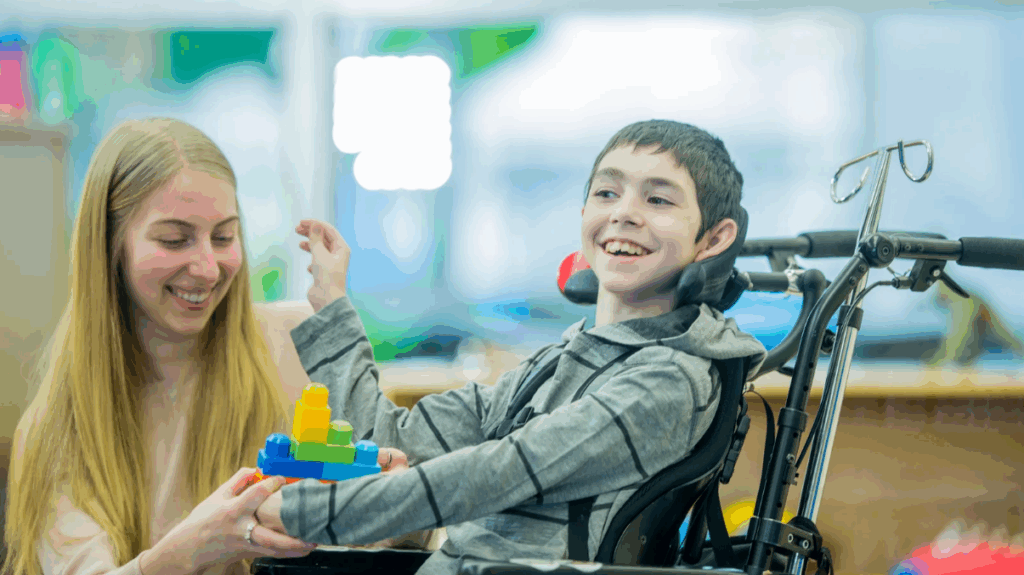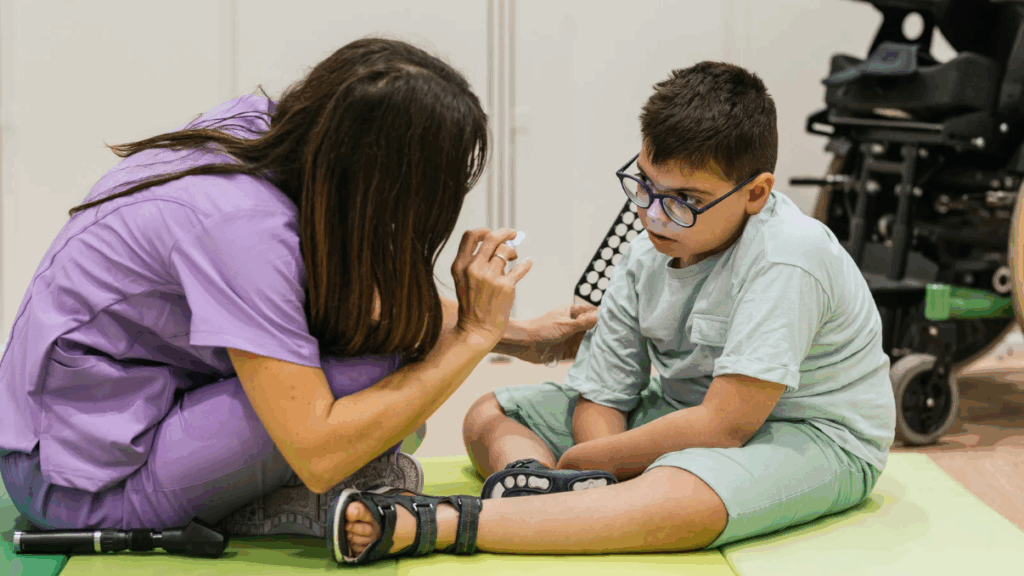
When a loved one is diagnosed with an Intellectual or Developmental Disability (IDD), families often find themselves filled with questions and uncertainty. They may wonder what the diagnosis means, how it will shape their loved one’s daily life, and what kinds of services or support are available. The good news is that understanding what is an IDD is the first and most empowering step toward helping individuals live meaningful, confident, and independent lives.
Home and Community-Based Services (HCBS) providers play a vital role in guiding families through this journey. With the right knowledge, compassion, and individualized care, uncertainty can turn into clarity — and challenges can become opportunities for growth. This guide explores what is an IDD, its causes, early signs, and the many ways supportive programs help individuals thrive within their communities.
What Is an IDD?
The term Intellectual and Developmental Disabilities (IDD) refers to a group of conditions that impact how a person learns, communicates, and interacts with the world around them. These disabilities are usually present from childhood and affect intellectual functioning, adaptive behavior, or both.
- Intellectual Disabilities (ID) involve challenges with reasoning, learning, and problem-solving.
- Developmental Disabilities (DD) are broader, including conditions that affect physical, emotional, or behavioral development — such as autism, cerebral palsy, and Down syndrome.
Every individual with an IDD is unique. Some may need minimal support, while others may require more consistent, hands-on care. The key is understanding that a diagnosis doesn’t define someone’s potential. With patience, support, and access to the right services, people with IDD can live happy, purposeful lives at home and in their communities.
List of Intellectual and Developmental Disabilities
IDD includes a range of conditions, each with distinct characteristics and strengths. Understanding them helps families offer meaningful support.
- Autism Spectrum Disorder (ASD): A developmental condition that affects communication, behavior, and social interaction. Individuals may show unique interests and learning patterns.
- Down Syndrome: Caused by an extra chromosome, it often leads to mild to moderate intellectual disability and recognizable physical traits.
- Cerebral Palsy: A condition affecting movement, muscle tone, and posture due to early brain development issues or injury.
- Fragile X Syndrome: A genetic disorder that may cause learning challenges, anxiety, and sensory sensitivities.
- Fetal Alcohol Spectrum Disorders (FASD): Results from alcohol exposure before birth, leading to developmental, behavioral, and emotional difficulties.
- Learning Disabilities: Affect skills like reading, writing, or math, even when intelligence is within the normal range.
Causes and Risk Factors of IDD
IDD can arise from many different factors. Some are genetic, while others result from environmental or medical conditions during pregnancy or early childhood.
Common causes and contributing factors include:
- Genetic conditions: such as Down syndrome, Fragile X, or other chromosomal abnormalities.
- Complications during pregnancy or birth: oxygen deprivation, infections, or premature delivery.
- Environmental influences: exposure to toxins, malnutrition, or lack of prenatal care.
- Early childhood infections or injuries: brain infections or trauma that impact development.
It’s important to remember that IDD is never anyone’s fault. Many families blame themselves when they first receive a diagnosis, but these conditions often have complex origins beyond anyone’s control. What matters most is early identification, consistent care, and a supportive environment that encourages growth.
Early Signs and Symptoms to Watch For

Every child develops at their own pace, but noticing delays early allows families to get help sooner.
Common early signs of IDD may include:
- Delayed speech or difficulty understanding simple instructions
- Struggles with fine or gross motor skills (like holding objects, crawling, or walking)
- Limited eye contact or reduced interest in social engagement
- Trouble with problem-solving, learning, or memory retention
- Behavioral differences such as repetitive movements or difficulty adapting to change
- Unusual reactions to sounds, textures, lights, or other sensory input
- Challenges in following simple directions or completing age-appropriate tasks
- Difficulty recognizing familiar people, objects, or routines
- Limited use of gestures, facial expressions, or imitation during play
- Slow development of self-care skills such as feeding, dressing, or toileting
- Emotional outbursts, frustration, or anxiety during routine transitions
- Lack of curiosity or reduced interest in exploring new environments
Parents are often the first to notice when something feels “different.” Trusting your instincts and seeking developmental screening is one of the most loving steps you can take.
How IDD Affects Daily Life
Intellectual and developmental disabilities can influence many areas of daily living, but with understanding and support, individuals can still lead meaningful, fulfilling lives.
Here are some ways IDD may affect daily life:
- Communication and social interaction: Some individuals may have difficulty expressing thoughts, understanding others, or engaging in conversations.
- Learning and problem-solving: Tasks that involve memory, focus, or reasoning may take extra time or support to complete.
- Self-care and independence: Daily routines such as dressing, eating, or managing personal hygiene may require assistance or adaptive strategies.
- Emotional and behavioral regulation: Changes in routine or environment can sometimes lead to frustration, anxiety, or sensory overwhelm.
- Social participation: Building friendships, joining activities, or adjusting to community settings may take gradual guidance and encouragement.
- Employment and life skills: Adults with IDD may need job coaching, structure, or support to succeed in work and independent living.
- Health and safety awareness: Some may need reminders or supervision to manage medications, follow safety rules, or make healthy choices.
Support and Treatment Options for Individuals with IDD
There’s no single treatment for IDD because every person’s needs are different. Instead, the goal of care is to promote independence, improve quality of life, and support families in providing ongoing care.
Common supports and therapies include:
- Behavioral Therapy: Helps manage challenging behaviors and teaches positive coping skills.
- Speech Therapy: Improves communication and language development.
- Occupational Therapy: Builds daily living and motor skills for independence.
- Physical Therapy: Enhances mobility, coordination, and strength.
- Educational Support: Individualized Education Plans (IEPs) and tailored classroom settings help students learn at their own pace.
- Counseling and Psychiatric Support: Addresses emotional well-being, anxiety, and mental health needs often associated with IDD.
A comprehensive approach that combines these services — with strong family participation — ensures that care is not just about managing challenges, but nurturing growth.
Where to Get Services if Someone Has IDD?

If someone you love has an IDD, you don’t have to navigate the journey alone. Many organizations, including Home and Community-Based Services (HCBS) providers, specialize in supporting individuals with intellectual and developmental disabilities right where they live — at home and in the community.
Understanding HCBS and How It Works
HCBS programs are often funded through Medicaid waivers and state-run systems such as the Texas Health and Human Services Commission (HHSC) or equivalent agencies in other states. These programs allow individuals with IDD to receive the care they need in familiar environments, surrounded by family and community rather than in institutional settings.
How to Access Services
- Contact your local IDD authority or HCBS provider. They can explain eligibility requirements and guide you through the application process.
- Request an assessment. This helps determine the type and level of services your loved one may qualify for.
- Develop a person-centered plan. Together with care professionals, you’ll outline the goals, daily supports, and skills your loved one needs to build independence.
Types of Services Available
HCBS providers typically offer a wide range of supports, including:
- Personal assistance with daily activities (bathing, dressing, meals)
- Nursing and behavioral health support
- Skill-building programs (money management, cooking, social skills)
- Respite care for family caregivers
- Transportation to work, school, or community events
- Supported employment and volunteer placement
Choosing the Right Provider
Selecting a provider is a deeply personal decision. Look for organizations that emphasize:
- A person-centered approach that honors individuality
- Qualified and compassionate staff who communicate openly
- Cultural competence and respect for your family’s values
- A commitment to empowering independence and inclusion
The right provider doesn’t just deliver services — they become a partner in your loved one’s growth and success.
How Home and Community-Based Services (HCBS) Make a Difference
HCBS programs are built on one simple but powerful belief: Everyone deserves the chance to live their best life — at home, in their community, and with dignity.
Through individualized care plans, consistent support, and community engagement, HCBS empowers individuals with IDD to:
- Develop daily living and social skills
- Form meaningful relationships
- Participate in work or volunteer activities
- Build confidence and autonomy
For example, a young adult with Down syndrome might receive training in meal preparation and budgeting through an HCBS program, helping them gain the confidence to live more independently. Another person with autism might learn coping techniques and social skills that make community involvement more comfortable and enjoyable.
These aren’t just services — they’re life-changing opportunities for connection, growth, and empowerment.
Tips for Families Navigating IDD Care

Caring for a loved one with IDD is a journey of both challenge and reward. Here are some practical ways to stay organized, resilient, and supported along the way:
- Keep detailed records of medical evaluations, progress reports, and care plans.
- Build a reliable care team that includes doctors, therapists, educators, and support staff.
- Prioritize self-care. Caregivers need rest and emotional support, too.
- Join local support groups to connect with families on similar journeys.
- Celebrate small milestones. Progress may come in little steps, but each one is worth acknowledging.
Remember — you are not alone. With the right network of care, individuals with IDD and their families can thrive together.
Conclusion: Empowerment Through Understanding
An IDD diagnosis can feel overwhelming at first, but it’s also an invitation to build a supportive, empowered life — one grounded in compassion, inclusion, and possibility.
Understanding IDD isn’t about labeling limitations; it’s about unlocking potential. With early intervention, family advocacy, and strong community partnerships, individuals with IDD can lead meaningful, fulfilling lives surrounded by people who believe in their abilities.
If you’re ready to explore Home and Community-Based Services for your loved one, ANN&AGNES Healthcare Solution Agency is here to help. Together, we can design a care plan that nurtures growth, independence, and joy — right where it matters most: at home and in the heart of the community.
